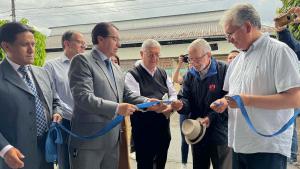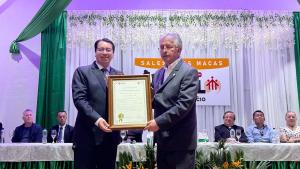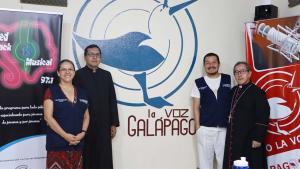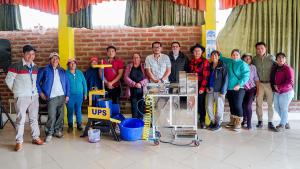Noticia
Students provided electricity to a remote community in Guayaquil
"Masa 2" is a small community in the district of Puná which does not have basic services, there is no electricity and no cell phone signal. 17 families live in this community, their work is catching crabs and making crafts.
"When we took students to these remote places, we noticed there were no utility poles", said Gary Ampuño, director of the electricity engineering undergraduate program in our branch campus in Guayaquil.
Since 2008, the Electricity program carries out several projects to help communities in Guayaquil. The projects began in the town of Puerto Roma, where preventive and corrective maintenance was carried out on the photovoltaic panels installed by the State, they provided maintenance in neighboring communities.
For two months, nine students and graduates examined "Masa 2", they carried out demographic studies to know the situation of the community. Kevin Catagua and Gustavo Guerrero's project consists of the installation of three public lighting poles, which consists of a solar panel. The poles are five meters high, separated by 15 meters and have an opening angle of 115 °, each photovoltaic system lasts about 12 hours and has a sensor that once it begins to get dark, at approximately 6:00 p.m. the luminaires are turned on.
"The aim of our project is to provide lighting on the road that connects the community of Masa 2 with the city and to make a call to universities and future engineers to continue helping the community, since what we did was basically the beginning, there is much more work to do here", said Catagua.
Santiago Villegas and Luis Alcívar, carried out an analysis of the demand of energy at the Simón Bolívar school to later install solar panels with a box of electronic elements that, through a battery bank, provides electricity to the institution. They also installed a computer.
"From the beginning I was interested in participating in a project that would benefit a community that really needs our support and be able to put into practice the knowledge we have learned in class. Seeing children in class makes up happy, "added Villegas.
"This would not have been possible without students' support, they found a way to help society", said Ampuño.
Gisella Anastasio, director of the Simón Bolívar School, said: "I am grateful with everyone from Universidad Politecnica Salesiana, because it is the first time that this type of project has been carried out here in the community, I have been working here for seven years and we are happy that university students have come, we hope to continue with more projects."
"The inhabitants are totally grateful for all the work that has been done and what the community hopes is that it will not be forgotten, but that more graduates, university colleagues, continue to help, either by expanding the projects ", stated Kevin Catagua.
"I invite public and private institutions to invest in these communities, to help us implement these projects because it provides a positive social impact. Children are very happy to see and use the new computer, which works with solar energy. We invite you to help implement more projects in these remote communities", sated Ampuño.
Contenidos Relacionados
Contenidos Relacionados
Noticias Relacionadas
Noticias Relacionadas





Follow us
Follow us